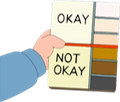I do stand by it. But it’s not an interesting discussion for me to just go back and forth on a definition.
I’m trying to understand if we can agree on basic facts. I suspect that we cannot, which means there’s not much point in having any discussion. But I’m open to the chance that we can.
“Never believe that anti-Semites are completely unaware of the absurdity of their replies. They know that their remarks are frivolous, open to challenge. But they are amusing themselves, for it is their adversary who is obliged to use words responsibly, since he believes in words. The anti-Semites have the right to play. They even like to play with discourse for, by giving ridiculous reasons, they discredit the seriousness of their interlocutors. They delight in acting in bad faith, since they seek not to persuade by sound argument but to intimidate and disconcert. If you press them too closely, they will abruptly fall silent, loftily indicating by some phrase that the time for argument is past.”
― Jean-Paul Sartre
So, if I got into my government and made them recognise the dust bowl as a genocide, does that make it a genocide? Do countries‒who care a lot more about politics than the truth‒get to say what is and isn’t a genocide?
Raphael Lemkin (a pioneer of genocide studies[79]: 35 who coined the term genocide, and an initiator of the Genocide Convention), James Mace, Norman Naimark, and Timothy Snyder have written that the Holodomor was a genocide and the intentional result of Soviet policies under Stalin.
Here’s a challenge; find an academic work written by a serious historian after the opening of the Soviet archives that considers the 32-33 Soviet famine to be a deliberate genocide.
And while you’re at it, go back and answer 新星’s question, which you are still dodging.
Also, didn’t you say you weren’t interested in arguing about definitions?
Let’s see. 34 countries and the EU consider the Holodomor (check your spelling btw) a genocide.
I can find… well, you, and nothing else claiming the dust bowl is a genocide.
Interesting; and when did they make this entirely non-political determination?
Also, that leaves 161 countries that don’t consider it a genocide. Oh, but let me guess:
I didn’t realize that whether something was a genocide or not was decided by vote.
It’s not not a vote. It’s a classification; they tend to not have perfect clear boundaries, and so one goes with the prevailing opinion of experts.
But let’s forget the term “genocide”. In the USSR, millions of people were intentionally killed for no good reason. That’s fucked.
Which you didn’t do, you instead tried to act like the votes of white European countries were the determinants.
No, you used it, stand by it.
I do stand by it. But it’s not an interesting discussion for me to just go back and forth on a definition.
I’m trying to understand if we can agree on basic facts. I suspect that we cannot, which means there’s not much point in having any discussion. But I’m open to the chance that we can.
Then do so, don’t try and equivocate.
We were not arguing about definitions.
Sure, but don’t expect me to honor a double standard.
I have no idea what you’re on about or why I’ve humored you for so long. Have a good life.
“Never believe that anti-Semites are completely unaware of the absurdity of their replies. They know that their remarks are frivolous, open to challenge. But they are amusing themselves, for it is their adversary who is obliged to use words responsibly, since he believes in words. The anti-Semites have the right to play. They even like to play with discourse for, by giving ridiculous reasons, they discredit the seriousness of their interlocutors. They delight in acting in bad faith, since they seek not to persuade by sound argument but to intimidate and disconcert. If you press them too closely, they will abruptly fall silent, loftily indicating by some phrase that the time for argument is past.” ― Jean-Paul Sartre
It’s exactly the same for anticommunists.
you lost the debate, get over it. BTW the loser gets banned.
For transparency of the record, the Lemmygrad mod log states “troll” as the official reason for the ban.
Petition to change it to
So, if I got into my government and made them recognise the dust bowl as a genocide, does that make it a genocide? Do countries‒who care a lot more about politics than the truth‒get to say what is and isn’t a genocide?
Okay, how about the guy who coined the term?
https://en.m.wikipedia.org/wiki/Holodomor
Wikipedia as a source. Amazing.
Here’s a challenge; find an academic work written by a serious historian after the opening of the Soviet archives that considers the 32-33 Soviet famine to be a deliberate genocide.
And while you’re at it, go back and answer 新星’s question, which you are still dodging.
Also, didn’t you say you weren’t interested in arguing about definitions?